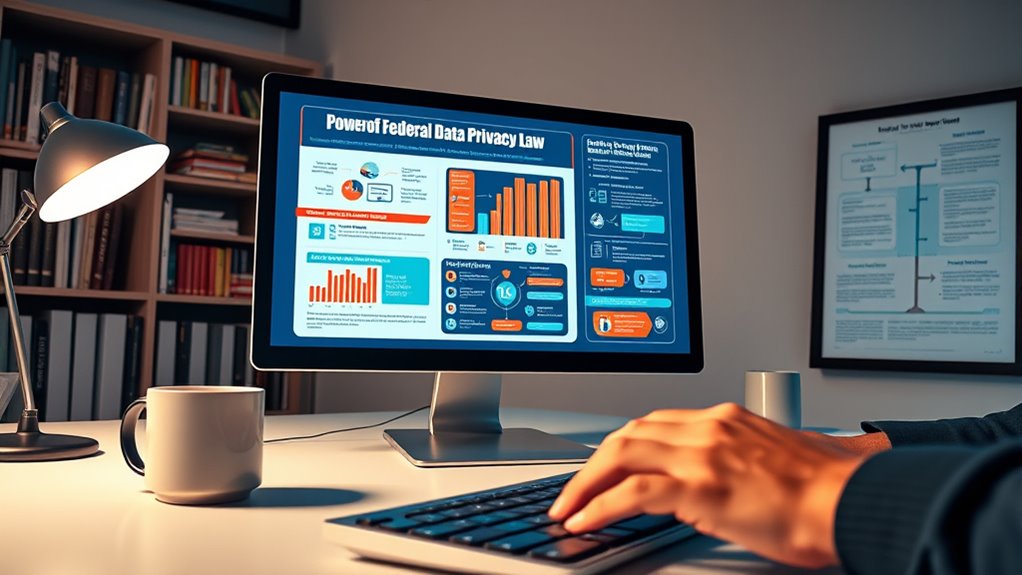The new federal data privacy law gives you stronger rights over your personal information, including accessing what data companies hold, requesting corrections, and asking for deletions. It requires organizations to be transparent about their data practices, limit what they collect, and guarantee your data is secure with encryption and breach notifications. Privacy by design is encouraged to build trust and accountability. If you want to understand how these protections work and what you can do, keep exploring the details.
Key Takeaways
- Consumers can access, correct, or delete their personal data and have enhanced control over how their information is used.
- Companies must be transparent about data collection, purposes, and set limits to responsible data handling.
- Organizations are required to implement security measures, notify users of breaches, and protect against unauthorized access.
- The law emphasizes data accuracy, verification, and responsible management to ensure data integrity and trustworthiness.
- Privacy by Design is promoted, encouraging companies to embed privacy protections from the start and promote transparency and accountability.

Understanding federal data privacy law can seem complicated, but it’s crucial as more of your personal information is collected online. With the new federal law in place, you now have clearer protections designed to safeguard your rights and improve data security. The law sets out specific rules that organizations must follow when handling your personal data, giving you more control over what information is collected, how it’s used, and who can access it. This means that companies can’t just gather your data without your knowledge or consent; they’re required to be transparent about their practices and provide options for you to manage your privacy preferences.
Federal data privacy law gives you clearer rights and control over your personal information online.
One of the core aspects of this law is reinforcing your consumer rights. You now have the right to access the data that companies hold about you, request corrections if it’s inaccurate, and even ask for your data to be deleted. These rights empower you to take more charge of your personal information, ensuring that it isn’t misused or kept longer than necessary. Additionally, if a company fails to comply with these rules, you have avenues to report violations and seek enforcement, which helps hold organizations accountable. This shift aims to build trust and give you confidence that your data isn’t being exploited or mishandled.
Data security is another critical element of the law. It mandates that organizations implement robust safeguards to protect your information from breaches, hacking, or unauthorized access. Companies are now required to take proactive steps—such as encryption, regular security assessments, and employee training—to ensure your data remains safe. If a breach does occur, the law obligates organizations to notify you promptly, so you can take appropriate action to protect yourself from potential harm like identity theft. These security measures are designed to reduce the risk of data leaks, making it harder for cybercriminals to exploit your information. Furthermore, the law emphasizes the importance of high-quality data, requiring organizations to verify the accuracy and completeness of the information they process to uphold your rights and privacy. Incorporating data verification practices can help organizations better comply with these requirements and maintain trust with consumers.
Additionally, the law promotes privacy by design, encouraging organizations to integrate privacy protections into their systems from the outset rather than as an afterthought.
Furthermore, the law clarifies what types of data are protected and sets limits on what organizations can do with that data. It emphasizes transparency, requiring companies to clearly explain their data collection practices, the purpose behind them, and how long they plan to keep your data. This way, you’re not left guessing about what’s happening with your personal information. The law also promotes responsible data handling, discouraging unnecessary data collection and encouraging organizations to minimize the amount of information they gather. Additionally, understanding the importance of natural harmonics in 432 Hz, the law underscores that organizations must ensure the accuracy and integrity of the data they process to uphold your rights and privacy.
Frequently Asked Questions
How Does the Law Define Sensitive Personal Data?
You might wonder how the law defines sensitive personal data. It classifies certain information as sensitive based on privacy thresholds, meaning data that could cause significant harm if disclosed. Sensitive classification includes details like health records, biometric data, and racial or ethnic origins. The law emphasizes safeguarding this data more strictly, requiring additional safeguards to ensure your privacy isn’t compromised, especially when it meets specific privacy thresholds set by the legislation.
Are There Any Penalties for Non-Compliance?
Imagine a gatekeeper holding a golden scale, balancing justice and protection. If you overlook it, penalty enforcement becomes swift, with fines and sanctions that hit hard. Non-compliance increases compliance costs and risks, making safeguarding data essential. You’ll want to stay on the right side of the law to avoid penalties, protect your reputation, and ensure trust, much like maintaining harmony with the scale’s delicate balance.
Does the Law Apply to Small Businesses?
You might wonder if the law applies to your small business. While there are some small business exemptions, you still face compliance challenges if you handle sensitive data. The law aims to protect consumer privacy, so even smaller companies must implement certain measures. Ignoring these requirements could lead to penalties, so it’s wise to stay informed and prepare for compliance, regardless of your business size.
How Can Consumers Exercise Their Data Rights?
Think of exercising your data rights like opening a door to your digital life. You can give or withdraw consumer consent easily, just like flipping a switch. The law empowers you to access your data and request data portability, moving your info from one platform to another. To do this, contact companies directly, and they must honor your requests promptly, ensuring you stay in control of your personal information.
What Are the Exceptions to Data Disclosure Requirements?
You should know that there are exceptions to data disclosure requirements, especially when it involves a data breach or third-party access. If disclosing your data could compromise security or aid malicious actors, companies might withhold certain information. They may also limit disclosure if it could harm ongoing investigations or violate other legal obligations. These exceptions aim to balance transparency with protecting your safety and privacy rights in sensitive situations.
Conclusion
So, while the new federal data privacy law might seem complex, it’s really about giving you more control over your personal info. Think of it as a shield, protecting you from companies that want to use your data without permission. If you believe that privacy should be a right, not a privilege, then this law is a step in the right direction. And who knows? Maybe someday, it’ll become the standard everyone can rely on.
Amina brings over a decade of journalism experience to her role as Editor-in-Chief. Under her leadership, Exquisite Post has flourished, maintaining the highest standards of integrity and excellence. Amina’s commitment to truth and her visionary approach guide the editorial team in producing impactful news stories that resonate with our audience.










